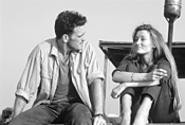Matt Dillon learned his lesson early: Suck up to the Hollywood fat cats, and you'll keep working. From his adolescent launch in the troubled teen flick Over the Edge, to dalliances with Francis Ford Coppola, Garry Marshall, Gene Hackman, and Michael Douglas, the actor has been everybody's boy. Now, as star, co-writer, and director of City of Ghosts, he's taking the lion's share of responsibility for a feature film for the first time. One might say he's become his own man.
Basically, what we have here is another stranger-in-a-strange-land yarn, but in terms of atmosphere, the director goes to great lengths to tart up the threadbare paradigm. As Jimmy Cremmins, a slick nobody insurance broker, Dillon convincingly delivers his character's inner and outer journeys, which range from Big Apple ennui to Cambodian exotica. His transition begins immediately, as a hurricane in the southern U.S. brings to bear all the bogus coverages sold by his overseas higher-up, Marvin (later revealed to be James Caan in typical grunty mode). When the FBI strongly advises Jimmy to surrender his passport for the duration of their investigation, he catches the first breeze to Bangkok in search of Marvin, and the music on the soundtrack just keeps getting better.
In appraising a movie, this may not seem like a priority to some, but really, City of Ghosts features one of the coolest soundtracks of the year (or at least the year up to now). Some credit is due to composer Tyler Bates of the rock band Pet, but there's a long list of original recordings from artists Chan Chaya, Pen Ran, Choun Malai, and others. From pretty little feasts of gamelan and fiddle to deft bursts of concertina to funky Eastern techno, the sounds are as impressive as the visuals (and given the lavish frames of cinematographer Jim Denault, that's saying a lot). At the movie's end, Dengue Fever's weird, wonderful take on Joni Mitchell's "Both Sides Now" even heals one's damaged ears after the damnable karaoke tune burped up by Caan about halfway through. Well, almost.
The plot, as conceived by co-screenwriters Dillon and Barry Gifford (Wild at Heart), is fairly routine, which is perhaps the movie's biggest weakness. Jimmy basically wanders the East in search of Marvin, encountering harsh realities and questing after the high-maintenance moll (delivered by Natascha McElhone as the epitome of British chilliness), until he finds out that Marvin isn't what he'd hoped for, forcing him to reclaim his life on his own terms. Serviceable, you could say.
In Bangkok, Jimmy meets up with Kaspar (Stellan Skarsgard), another associate of Marvin's, whose flirty Thai concubine marks him as the first of many grotesque ex-pats littering the landscape ("I'll make a lady out of her," he vows unconvincingly, and the effect is the same as writing "LOSER" across his own forehead). Kaspar tips off Jimmy to Marvin's whereabouts somewhere in the vicinity of Phnom Penh, and before we know it, Jimmy's in the Kingdom of Cambodia, forging a friendship with a capricious yet world-weary cyclo driver named Sok (Sereyvuth Kem, the film's big discovery). West meets East, fun meets danger, and the movie completely eclipses such recent dippy fare as The Beach, landing much closer to Phillip Noyce's The Quiet American, in terms of quality and overall style.
Either most amusing or most disturbing (you decide) is good ol' Gerard Depardieu as Émile, proprietor of the movie's central bar and fleabag hotel. This man has issued a lot of bombast in his time, but here he sets a new standard, huffing and puffing and blowing the house down. It's almost as if his character from Green Card -- the one who shouted down his vegetarian foil as a "Cucumber!" -- has returned with a vengeance. The man lives very large throughout the movie, and he's a hoot.
The other characters are all a bit sketchier, and this could be due to an actor sitting in the director's chair, juggling too much. Refreshingly, Dillon does not fall into the trap of lingering on his own profundity or leaving his movie too long for enjoyment (it's smartly cut by Howard E. Smith, with -- again -- an emphasis on local atmosphere), but he does stumble a bit. Apart from Depardieu's blustery caricature, all the Westerners in the film come across as types rather than fleshly souls, and no amount of dirty-dealin' or death-defyin' can conceal their underwritten natures; the Paternal Heavy and the Girl Who Loves Art are not much more intriguing than the Mischievous Monkey.
That said, City of Ghosts is still one of the richest movies to come along in a while, rife with local talent (real Buddhist monks, Cambodian midget comedian Loto, and many others) and oozing an exotic sense of history like the sweaty, peeling walls of local temples. Overall, at the helm, Dillon has scored. Haunting and wholly engrossing his film is not, but a valiant and adventurous first feature it most definitely is.










